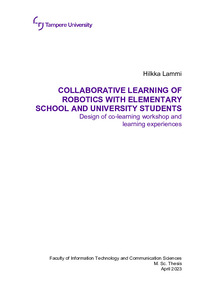Collaborative Learning of Robotics with Elementary School and University Students : Design of co-learning workshop and learning experiences
Lammi, Hilkka (2023)
Lammi, Hilkka
2023
Tietojenkäsittelyopin maisteriohjelma - Master's Programme in Computer Science
Informaatioteknologian ja viestinnän tiedekunta - Faculty of Information Technology and Communication Sciences
This publication is copyrighted. You may download, display and print it for Your own personal use. Commercial use is prohibited.
Hyväksymispäivämäärä
2023-05-23
Julkaisun pysyvä osoite on
https://urn.fi/URN:NBN:fi:tuni-202304264722
https://urn.fi/URN:NBN:fi:tuni-202304264722
Tiivistelmä
In the future, the number of robots and their areas of application are expected to increase. Robotics literacy, knowledge and understanding of what robots are and what are their features, is a skill needed to form an appropriate relationship with the robots. Robot literacy is already taught to children in schools, but extra-curricular activities have been introduced in robotics education research as meaningful ways of learning different aspects of robots and robotics. The learners of robotics have benefited from co-learning experiences, where they collaborate with other groups of learners to solve problems and challenges together. Children collaborating in learning robotics with parents has proved to increase their knowledge, skills, and confidence regarding robots, and it has helped the parents to motivate their children to learn. The present research acknowledges the benefits of robotics co-learning for learners familiar with each other.
In this thesis, we designed and evaluated a co-learning robot workshop designed for the novel pairing of co-learners, 8th-graders, and university students. The workshop consisted of three robot-related co-learning tasks, using robots Spot, QTrobot and Clicbot. The university students facilitated the workshop tasks. In the pre-study phase, we conducted a co-design week with one 15-year-old pupil participant, and we made an initial design for the workshop. Nine 8th-graders and six university students participated in the workshop and the evaluation of it. The pupils’ teacher participated in the pre-study and evaluation of the workshop. The workshop was held at Tampere University Hervanta campus in Robostudio, a multidisciplinary co-learning space with multiple robots.
The results of the co-learning robot workshop were positive, and the participants enjoyed the co-learning experience. The pupils learned about robots and programming, and the students learned about interacting with the pupils. Co-learning robot workshops are beneficial for the participants to learn about robots and about communicating with diverse people. However, there were some things to be improved in the workshop, such as communicating instructions or ice-breaking. We formed eight design implications from the gathered data for a more comfortable, safe, and fulfilling co-learning experience. The design implications include suggestions to put on effort into ice-breaking and visual instructions related to the tasks and safety. Additionally, to motivate the participants to learn, they should be given the freedom to make choices regarding their work.
In this thesis, we designed and evaluated a co-learning robot workshop designed for the novel pairing of co-learners, 8th-graders, and university students. The workshop consisted of three robot-related co-learning tasks, using robots Spot, QTrobot and Clicbot. The university students facilitated the workshop tasks. In the pre-study phase, we conducted a co-design week with one 15-year-old pupil participant, and we made an initial design for the workshop. Nine 8th-graders and six university students participated in the workshop and the evaluation of it. The pupils’ teacher participated in the pre-study and evaluation of the workshop. The workshop was held at Tampere University Hervanta campus in Robostudio, a multidisciplinary co-learning space with multiple robots.
The results of the co-learning robot workshop were positive, and the participants enjoyed the co-learning experience. The pupils learned about robots and programming, and the students learned about interacting with the pupils. Co-learning robot workshops are beneficial for the participants to learn about robots and about communicating with diverse people. However, there were some things to be improved in the workshop, such as communicating instructions or ice-breaking. We formed eight design implications from the gathered data for a more comfortable, safe, and fulfilling co-learning experience. The design implications include suggestions to put on effort into ice-breaking and visual instructions related to the tasks and safety. Additionally, to motivate the participants to learn, they should be given the freedom to make choices regarding their work.
